How Will A Testosterone Supplement Affect My Beard
In a hurry? Here are our top picks:
While there are much worse things that can happen to a person than losing their hair, there's also no denying how incredibly frustrating it can be.
There are many reasons for hair lossand hair thinning, including genetics or nutrient deficiencies, and even more products and solutions,and shampoo for hair out there which claim to slow its progress while growing new hair.
Finding a hair loss shampoo one that works for you, however, can be easier said than done. But, we're here to help.
Although all of our picks represent the best shampoos available for hair loss each has its own minor differences which may or may not be of benefit to you. We outline what is missing or extra and how that should affect your purchasing decision.
Let's dig in.
Quick summary
3 Things you need to know before buying a hair loss shampoo
Before you grab just any bottle of hair-loss shampoo off the shelf – many don't work, which we'll touch on a bit later – there are a few things you need to keep in mind:
- Find out why you are experiencing hair loss. If it is due to a biotin deficiency, then you need to make sure you use products that contain biotin. If it is genetic (male or female pattern baldness) or related to a fungal infection, then ketoconazole is going to be your go-to shampoo.
- Read labels and read reviews. Search for products that have plenty of positive feedback and don't just trust Amazon reviews. Dig deeper, look at other retail websites that have reviews, and check the label of each product you are seriously considering buying. Again, most shampoos that claim to halt hair loss and grow new hair are nothing more than snake oil. Stick with ingredients that are clinically proven to work and backed by evidence (more on ingredients below).
- Use one shampoo that works and stick with it. The earliest you can start evaluating results is 6 months. You may also want to use a conditioner, preferably one made for people who are experiencing hair loss. When you find the one that works, don't change it.
The 4 key ingredients in hair loss shampoos
Whatever shampoo you use, look for the following four ingredients.
Research, though in its preliminary stages in most cases, has shown that all four can not only slow hair loss but also generate new growth.
Keep in mind that the only Food and Drug Administration medications used to treat male pattern baldness are topical minoxidil (a.k.a. Rogaine) and finasteride, more commonly referred to as Propecia.
For now, anyway.
Ketoconazole
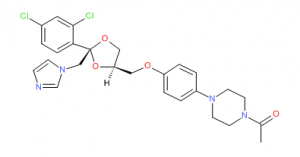 You'll find ketoconazole in Nizoral and other anti-dandruff shampoos. Preliminary research indicates that it may be effective in treating hair loss both alone or in combination with other treatments like minoxidil or finasteride. [1][2][3]
You'll find ketoconazole in Nizoral and other anti-dandruff shampoos. Preliminary research indicates that it may be effective in treating hair loss both alone or in combination with other treatments like minoxidil or finasteride. [1][2][3]
Researchers found that 2% ketoconazole and minoxidil regimens improved hair density, size, and proportion of anagen follicles.
Ketoconazole is also useful in treating a fungus called Pityriasis that often inhabits the hair growth on the scalp.
Studies showed that the most effective use of 2% ketoconazole shampoo was one application every two to four days, leaving the shampoo on the scalp for three to five minutes after it has been applied.
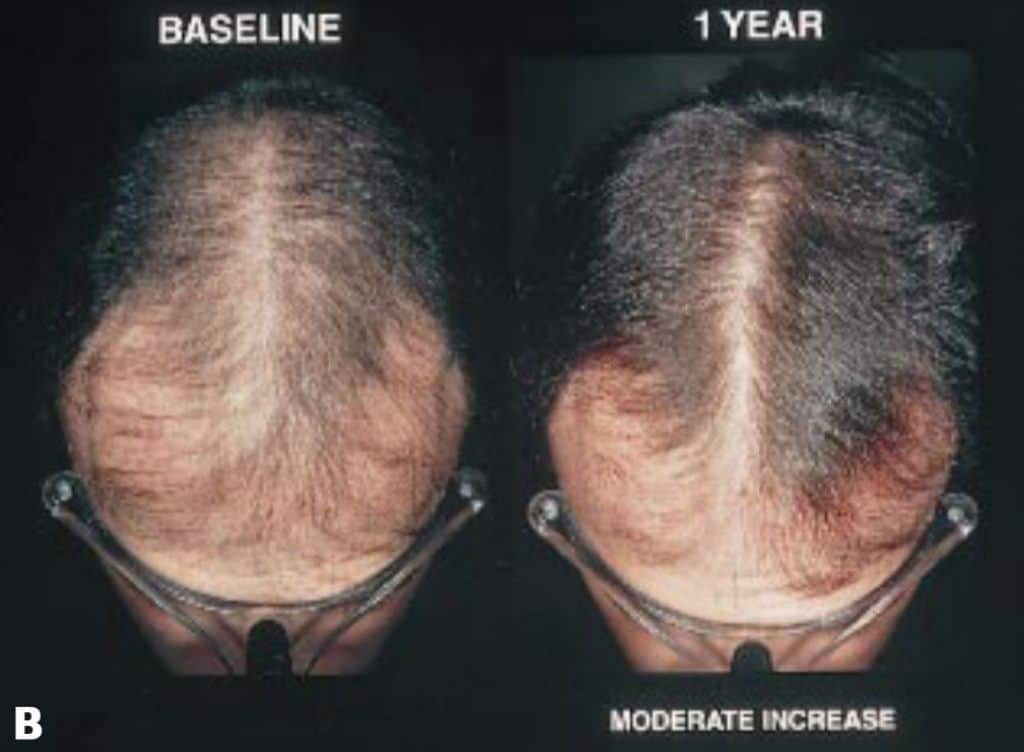
Caffeine
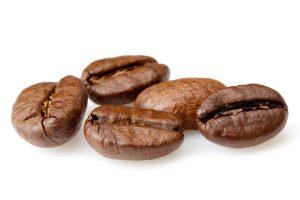
Yes, caffeine. Most use caffeine as an ever-important (if not mandatory) jolt of energy in the morning – or anytime our asses are dragging – but studies are beginning to show that caffeine "counteracts" the suppression of hair-follicle production by testosterone in males. [4][5].
Specifically, caffeine enhanced the length of hair shafts, prolonged anagen duration, and stimulated keratinocyte growth. Keratinocyte is the most abundant cell found in the epidermis, the outer layer of your skin.
OK, we know what's on your mind at this point, and the answer is no.
Drinking massive quantities of coffee or other caffeine-laden drinks will not help make hair grow.
As one German researcher pointed out, you'd have to drink 40 to 50 cups of coffee for caffeine to have any kind of therapeutic benefit for your hair roots because caffeine is easily diluted and quickly excreted by the body. [6]
Besides, that amount of coffee would be toxic because caffeine is, well, kind of a drug.
However, there are a variety of topical products available with caffeine that can be directly applied to your scalp and the studies show that topical application is the best, most effective mode of delivery. [7]
Even better, research shows that hair follicles don't build up a resistance to caffeine-based products as it does with some drugs.
Biotin
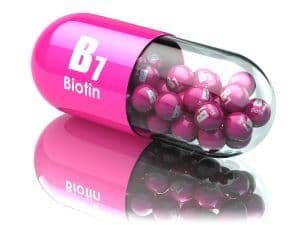 The benefits of biotin are based on research that shows that some hair loss is a consequence of biotin and zinc deficiency. [8][9]
The benefits of biotin are based on research that shows that some hair loss is a consequence of biotin and zinc deficiency. [8][9]
Also known as Vitamin B7, Biotin is a compound that's important for a wide range of bodily processes, including the synthesis of fatty acids, glucose, and some amino acids. Zinc is also vital for growing healthy hair and the functioning of the oil glands around follicles.
But, they also help to strengthen hair and nails. [10]
Biotin is a crucial component in skin cells, which also plays an essential role in hair follicle health. If your follicles are weak or unhealthy, they'll be unable to retain hair.
The good news is that you can get biotin from many, many food sources, including cooked eggs, peanuts, liver, Swiss chard, cauliflower, bananas, whole grains, mushrooms, and sardines. You can also try biotin shampoos.
Biotin, or zinc for that matter, will only suffice if your hair loss is from a deficiency in either of these nutrients. However, research shows that they make suitable add-on treatments for those with male or female pattern baldness as it led to the formation of stronger, healthier hair. [11]
Saw Palmetto

Saw palmetto is hardly new; the Indigenous Peoples of North America have been using it as medicine and as a food source for hundreds of years.
It's a small plant with berries whose extract shows promise as a way to treat hair loss (and it's already used as an herbal remedy to treat an enlarged prostate and a decreased sex drive).
What's the science behind it? An extract of saw palmetto berries may block an enzyme (5-alpha-reductase) that converts testosterone to DHT. [12]
DHT, if you didn't know, is responsible both for hair loss and enlargement of the prostate.
In one study, nearly half of men who were treated with saw palmetto had an 11.9 percent increase in total hair count. [13]
The berry extract from saw palmetto berries can be taken in pill form or from local or online health food stores.
Do most hair loss shampoos work?
The answer, to be brutally honest, is no.
Combine that with the fact that many shampoo manufacturers are hungry for a quick buck and make false claims about ingredients that haven't been proven to work, and you have a market that can be treacherous and expensive to navigate.
There are even fake reviews – which is a whole additional layer of deceit and trickery.
We're going to list the ones for you that are the real deal when it comes to hair loss shampoos, but buyer beware when you're roaming the hair care product aisle and thinking about buying anything less than the best.
Again, use trusted brands with proven results (backed by scientific study) and with plenty of positive, verified reviews.
And, remember, your hair loss may have many underlying causes, and your shampoo is just one part of your hair loss treatment. Lifestyle and nutritional changes may also be part of the solution.
That said, let's take a look at the hair loss shampoos that are the real deal.
The 6 best hair loss shampoos for men & women
1. Revita Hair Growth Stimulating Shampoo
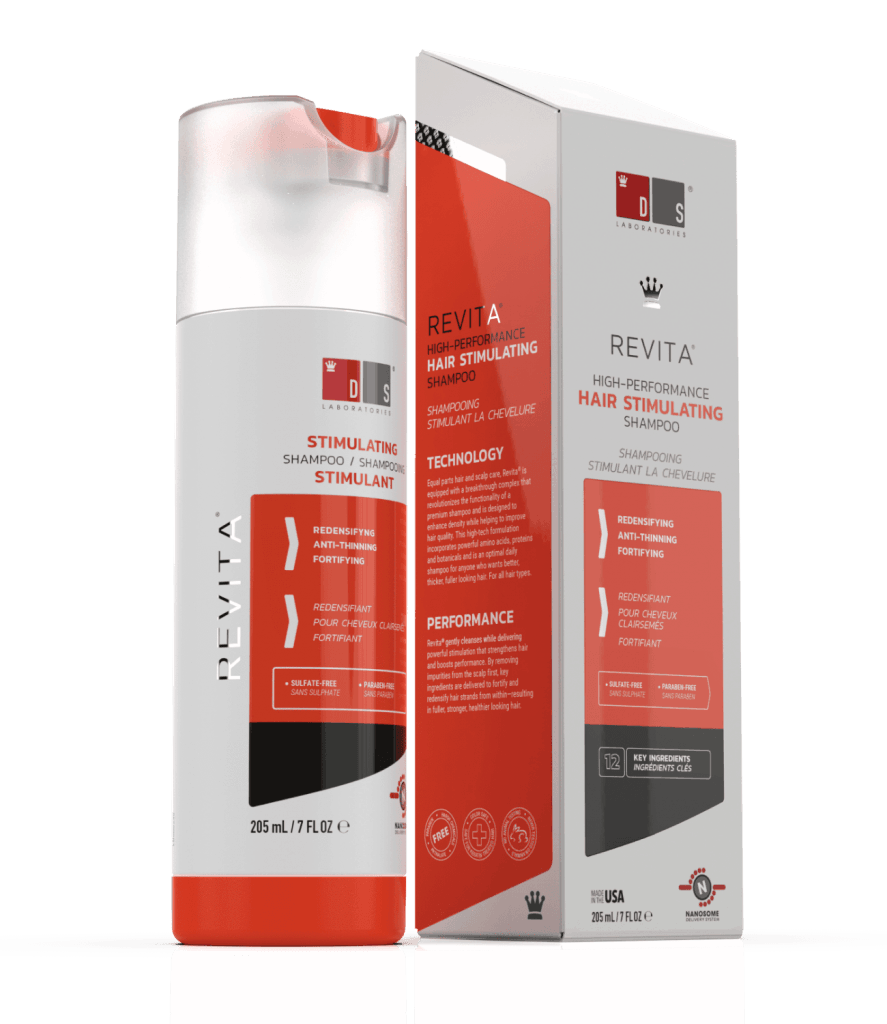
DS Laboratories combines proven ingredients with a unique delivery system in its Revita Hair Growth Stimulating Shampoo. The result is a potent product that helps fight hair loss while stimulating hair growth.
And you can't argue with the results. In one study of 500 men and women between the ages of 18 and 55, 90% of participants using Revita's shampoo reported a decrease in hair loss while 85% stated they had an improvement in the overall appearance of the hair. [14]
Indeed, Revita works, thanks to proven ingredients such as caffeine, biotin, and ketoconazole.
What you won't find in this shampoo are harsh chemicals such as sodium lauryl sulfate, a detergent often found in shampoos that can cause skin irritation, dryness, and hair loss.
Revita's Hair Growth Stimulating Shampoo also includes natural cleansers that boost hydration to your scalp and hair, increases protein levels, while also addressing the underlying factors of thinning hair.
The aforementioned unique delivery system is DS Labs' Nanosome system and how it delivers its ingredients to the hair and scalp. In short, Nanosomes – similar but more effective than liposomes, which are found in many cosmetic products – allow for a higher concentration and more efficient use of ingredients by helping them cross the skin barrier. [15][16]
DS Labs not only has the right ingredients to combat hair loss while improving hair density, but it also has the best method for getting those ingredients to the right place.
You can also use Revita's Hair Growth Stimulation Shampoo in conjunction with DS Labs Hair Stimulating Conditioner and Revita Tablets for Hair Revitalization for an enhanced effect.
Pros
- Natural, effective hair loss ingredients
- Unique delivery system
- Cleanses and improves the health of the hair and scalp
Cons
- Some users say it left their hair a little dry
Bottom Line
Revita's science-backed technology is second to none and benefits anyone wanting to reverse the effects of hair loss and thinning hair. It's a powerful-yet-gentle shampoo with proven results.
2. Ultrax Labs Hair Surge – Caffeine Hair Loss Hair Growth Stimulating Shampoo

OK, maybe not the best analogy, but if there were Academy Awards for hair-growth products, Ultrax Labs' Hair Surge would have its share of Oscars. And the company has only been around since 2012!
Seriously, the stuff works, and it has garnered a lot of attention since being introduced to the market.
It is one of only a few caffeinated hair shampoos made for both sexes. In fact, it has almost as many positive reviews online from women as it does from men.
One key reason that Hair Surge is a cut above other so-called hair loss shampoos is that it's formulated not just as a topical shampoo but as a transdermal one. That means the active ingredients do not just sit on the surface of the skin but are absorbed into the deeper tissues. [17]
Average shampoos include a couple of ingredients that are easily washed away before they have any impact on hair loss and hair growth. Hair Surge is also safe for all skin and hair types.
Hair Surge contains three key ingredients: caffeine, ketoconazole, and saw palmetto. As already mentioned, all three are essential ingredients in any shampoo that's truly designed for hair growth.
It doesn't contain biotin, but you can always take biotin as a supplement if you absolutely feel that you have to have it.
Remember:
Biotin is only necessary for those who are deficient, but it may lead to healthier hair for all.
Besides, if you still have doubts that Hair Surge actually works, you can sift through the thousands of positive comments and testimonials about it online.
Yes, Hair Surge is a bit pricier than your average hair loss shampoo, but that's the point – it's not your average hair loss shampoo. It's more expensive, but it also delivers where it matters most, on your head. The extra dollars that you would spend on this product would be worth picking it over a more affordable shampoo that would end in less results.
The folks at Ultrax Labs are confident enough that you'll see results from Hair Surge that they offer a 90-day money-back guarantee. They don't make many products – only three in their entire portfolio – but they have a firm belief in their formulas and remain focused on making the best they can be.
Pros
- Formulated to penetrate the skin, not just sit on top
- Proven results
- Backed by a money-back guarantee
Cons
- More expensive than other hair loss shampoos
3. Nizoral A-D Anti-Dandruff Shampoo

Nizoral will keep the flakes off of your head while keeping hair on it. It's a proven anti-dandruff fighter – good for even severe cases of those pesky white flakes – but, for our purposes, also able to treat hair loss.
And treat it pretty darn well, at that.
The critical ingredient in Nizoral is ketoconazole, which reduces the effects of DHT and hair follicle inflammation that contributes to hair loss [18]. Ketoconazole also kills fungi that cause dandruff, but there's not so much that it is toxic (which large amounts of ketoconazole can be).
Some argue that dandruff may contribute to hair loss; while there's no direct link (scratching is likely the real culprit), it's certainly worth noting here.
Nizoral's A-D Anti-Dandruff Shampoo has 1% ketoconazole, but you can get a 2% version of it in the U.S. with a prescription.
You can get the 2% percent version of it in Europe over-the-counter, although usually under a different name.
The beauty of Nizoral is that it performs three tasks simultaneously;1) it cleanses the scalp, 2) its anti-fungal properties combat dandruff, and 3) it blocks androgen receptors to deter hair loss.
Some caution should be taken when using Nizoral. Some studies have shown that leaving it on your hair for an extended period (i.e., more than five minutes) can cause rashes and irritation. Be careful if you have sensitive skin and always use as directed by the label or a medical professional. Pregnant women should not use Nizoral unless directed to do so by a physician. [19]
It's certainly worth noting that Nizoral also comes in a tablet form but sustained, long-term use of it (the pill) has the potential to cause liver damage. Besides, oral Nizoral hasn't been shown to have any benefits for hair loss.
Simply avoid the stuff altogether and stick with the shampoo.
Pros
- Fights dandruff and hair-loss
- Reduces hair-follicle inflammation
Cons
- Can cause dryness and irritation if left on too long
4. Lipogaine Big 5 All-Natural Shampoo

What's in a name? Well, that depends on what or who you're talking about, but the name is meaningful when discussing Lipogaine's Big 5 All-Natural Shampoo (which is different from its Big 3 option).
The Big 5 shampoo is a newer addition to the Lipogaine product line, and its five primary ingredients are biotin, caffeine, argan oil, castor oil, and saw palmetto – all of which help to fight hair loss.
A quick word on argan and castor oil: they are useful for treating hair loss and promoting hair growth because they promote the health of the scalp by reducing inflammation and moisturizing. Even better still, argan oil helps the other active ingredients penetrate the skin more effectively. [20][21]
It does not include ketoconazole, unlike the Big 3 version, at least according to its list of ingredients.
The rest of the ingredients are the same for Lipogaine Big 5 and Big 3 and work together to strengthen and nourish hair while preventing thinning and breakage.
Included in the long list of organic ingredients are rosemary oil, coconut oil, jojoba oil, green tea, cedarwood oil, and more. These ingredients are cleansing, nourishing, and can contribute to the hair growth process by growing out your natural hair using natural methods.
One of the positives of buying a hair-loss shampoo that contains most of the essential ingredients in fighting hair loss is that separately purchasing the ingredients isn't cost-effective.
A bottle of castor oil is in the $20 to $30 range, for instance.
Lipogaine's Big 5 is suitable for men and women and also safe to use on color-treated hair. It also comes with a 100% money-back guarantee.
Pros
- Safe for all hair types
- Gentle formula
- Good for men and women
Cons
- May dry out your hair if not used with a conditioner
5. Alpecin Caffeine Shampoo
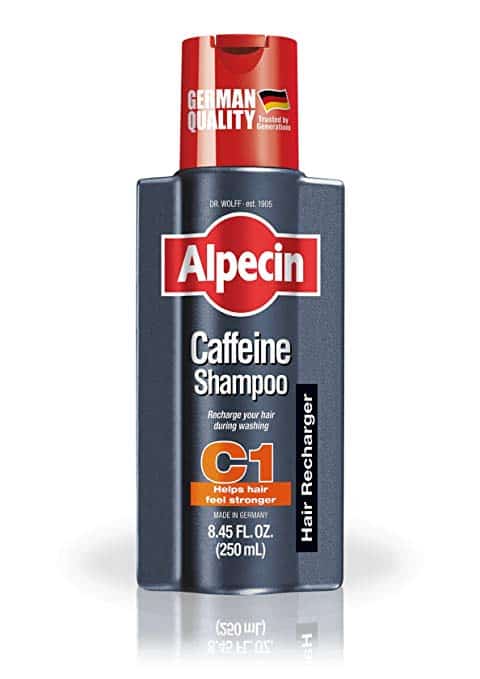
Earlier, we talked about the positive effect that caffeine has on stopping the spread of hair loss.
It's the primary active ingredient in Alpecin's excellent caffeine shampoo, which many users say produce the kind of results they've long sought.
Alpecin works, scientifically-speaking, by using caffeine to reduce DHT – a key factor in hair loss.
It also stimulates hair growth directly from the roots because its active ingredients (namely caffeine) help hair follicles grow faster while providing strength and volume to your hair. This encourages an increased rate of hair growth and the overall hair thickness, making the shafts stronger and more difficult to break off from the roots.
The caffeine included in Alpecin absorbs quickly into the scalp and covers the hair follicle from tip to root. You only need to leave the shampoo on for a couple of minutes to get its full effects before rinsing it off.
But back to how it works: Alpecin doesn't cause new hair growth. It only stimulates the growth of existing hair, which means that hair follicles that have been inactive can be made active again, resulting in noticeable hair growth in certain areas.
However, it nourishes and stimulates hair follicles that have, generally speaking, become dormant over time and contributed to the effects of male pattern baldness. It strengthens the roots of your hair and prevents follicles from falling out easily.
Besides treating hair loss, Alpecin Caffeine Shampoo is also able to treat scalp-related issues such as dandruff and itchy, sensitive skin. It's also safe to use on any skin type and effective for combating the effects of all kinds of hair loss.
Alpecin is a German-based company that's hardly new to the hair-loss game; after all, they've been around since 1905. They offer a variety of products designed to treat hair loss, including an after-shampoo liquid.
Pros
- Revives dormant hair roots
- Reduces DHT
- Also treats other scalp issues
Cons
- Designed for men although its caffeine-based is safe for women to use.
6. Classic Lipogaine Big 3 Hair Loss Prevention Shampoo

We've already included Lipogaine's Big 5 Hair Loss Shampoo on our list, but their Big 3 shampoo is worthy of inclusion as well. And that leads to the inevitable questions of, 1) what's the difference between the two, and 2) which one is better?
Both questions are simple enough to answer. You'll find the main differences in a side-by-side comparison of each product's ingredients; Big 3 contains ketoconazole, which the Big 5 does not, while the Big 5 adds natural ingredients such as argan oil and saw palmetto.
Which one is better? That's a tough call and, without trying to dodge the question, our view is that you need to see which one works best for you. All bodies are unique and respond differently, making it difficult to predict exactly which shampoo and skincare products would work best with every individual.
Both of these shampoos are packed with proven ingredients. Which is most effective will come down to how each individual reacts and the proper hair care regimen they follow.
That being said, the Big 3 is a classic version of a great all-around product, and you should see similar results from the Big 3 and Big 5.
If you've tried both, let us know which one you preferred in the comments below!
The most notable ingredients of the Big 3 are biotin (vitamin B7), castor oil, and emu oil.
We have discussed the first two. The latter helps defend against a variety of scalp and skin issues, including inflammation and allergic reactions—strange but true! [22][23][24]
It also moisturizes the skin.
While you could buy all three ingredients separately, it wouldn't be very cost-effective, and why bother if you can purchase them in a product designed for hair loss?
Lipogaine's Big 3, like the Big 5, is mild and free of harsh chemicals, and also is safe for color-treated hair, as well as all hair types. Another thing we like about it is that it comes with a full 90-day money-back guarantee.
Pros
- Designed for men and women
- Gentle formula
- Safe for all hair types
Cons
- Can't use as frequently as other hair loss shampoos
5 Tips for using hair loss shampoo the most effective way (A simple, illustrated guide)
Wet your hair, slap on some shampoo, massage it down to the scalp, rinse – that's all there is to using shampoo of any kind, right?
Well, sort of, but there's more to it than that, including how you should apply hair loss shampoos such as those we've listed above. The following are things to consider before you begin a hair loss shampoo regimen.
1. How soon is too soon?
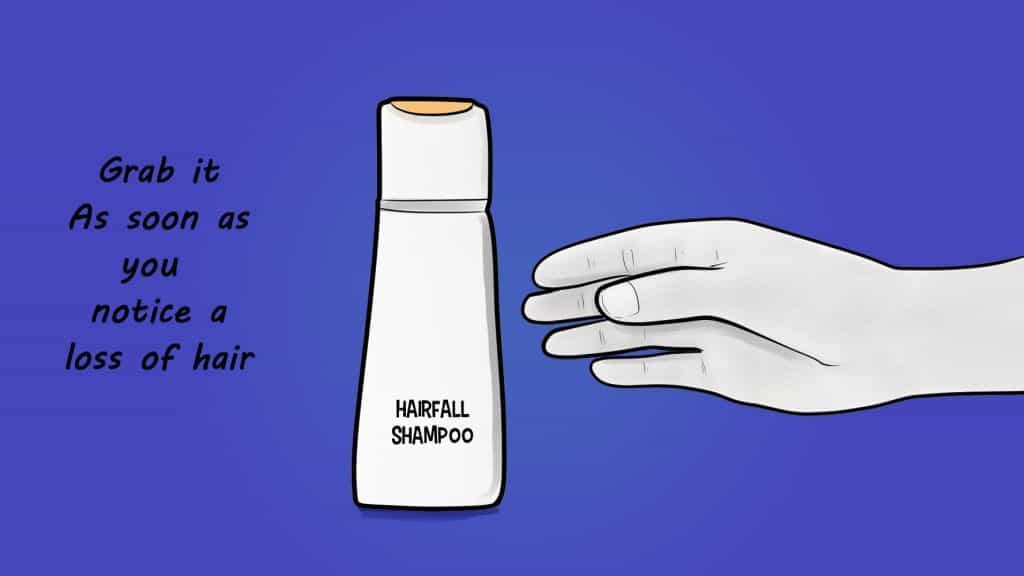 Most hair and hair loss experts agree that you can start using hair loss shampoo as soon as you notice a loss of hair.
Most hair and hair loss experts agree that you can start using hair loss shampoo as soon as you notice a loss of hair.
Well over half of all men experience hair loss by age 35 and many others by age 21. The bottom line: there's no reason to wait.
2. Let the shampoo soak a bit
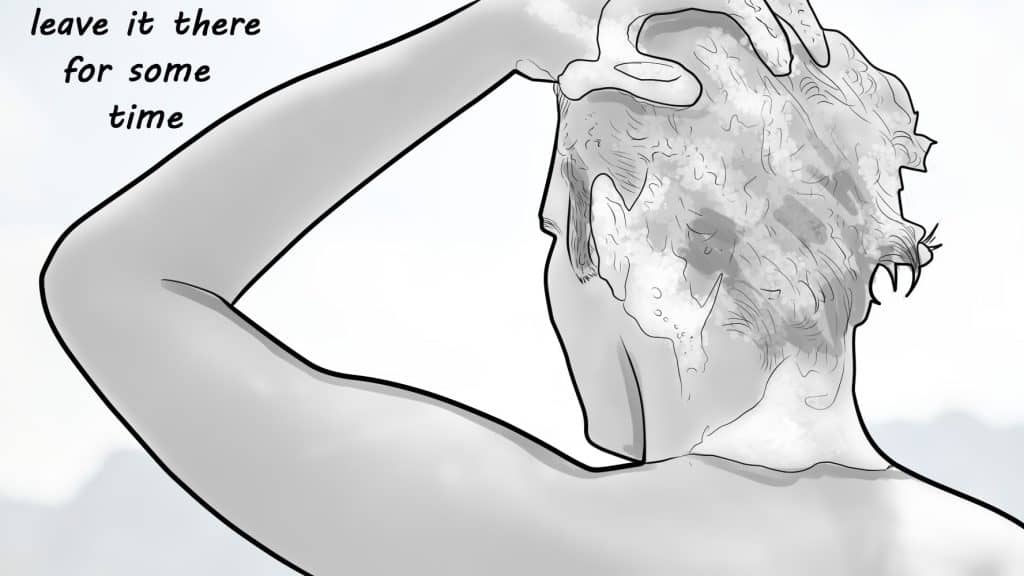 The method for applying hair loss shampoo is the same as regular shampoo, i.e., you apply it to wet hair, massage it into the scalp and rinse it.
The method for applying hair loss shampoo is the same as regular shampoo, i.e., you apply it to wet hair, massage it into the scalp and rinse it.
The difference with hair-loss shampoos, however, is that you should leave them in for a longer time before rinsing.
Doing so ensures that their ingredients reach your hair's roots and scalp, where they have the biggest impact.
3. Massage it in
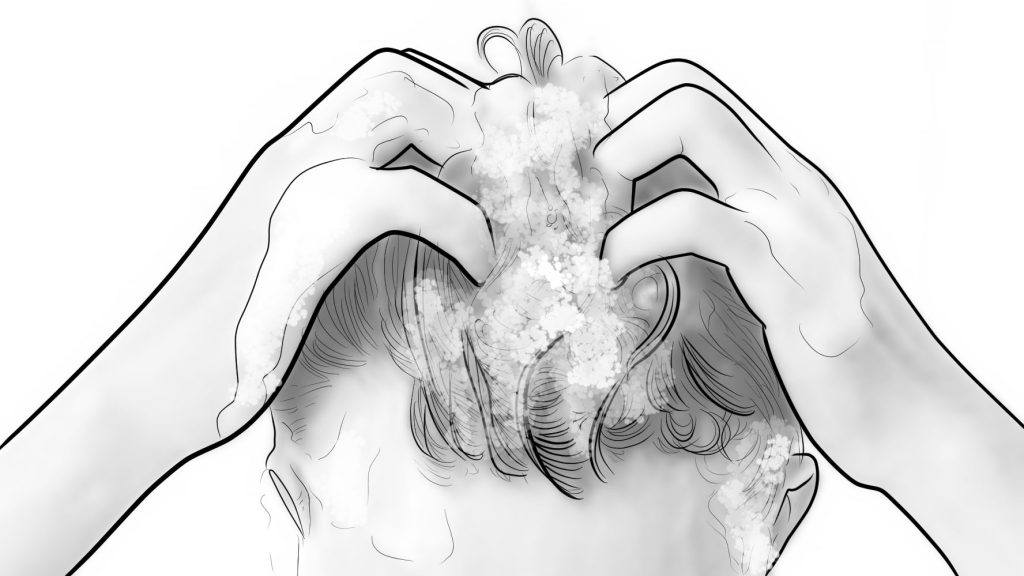 Take your time when massaging your shampoo into your hair and scalp. Hair pros recommend a one to three-minute massage to let the ingredients soak in. Always ensure that the shampoo reaches your scalp and not just your hair, as you need it to treat not just the damaged hair, but also an unhealthy or itchy scalp and the hair follicles on it.
Take your time when massaging your shampoo into your hair and scalp. Hair pros recommend a one to three-minute massage to let the ingredients soak in. Always ensure that the shampoo reaches your scalp and not just your hair, as you need it to treat not just the damaged hair, but also an unhealthy or itchy scalp and the hair follicles on it.
Plus, massaging your scalp with cleansing shampoos stimulates it and may spark those dormant hair follicles to return to action.
4. How often?
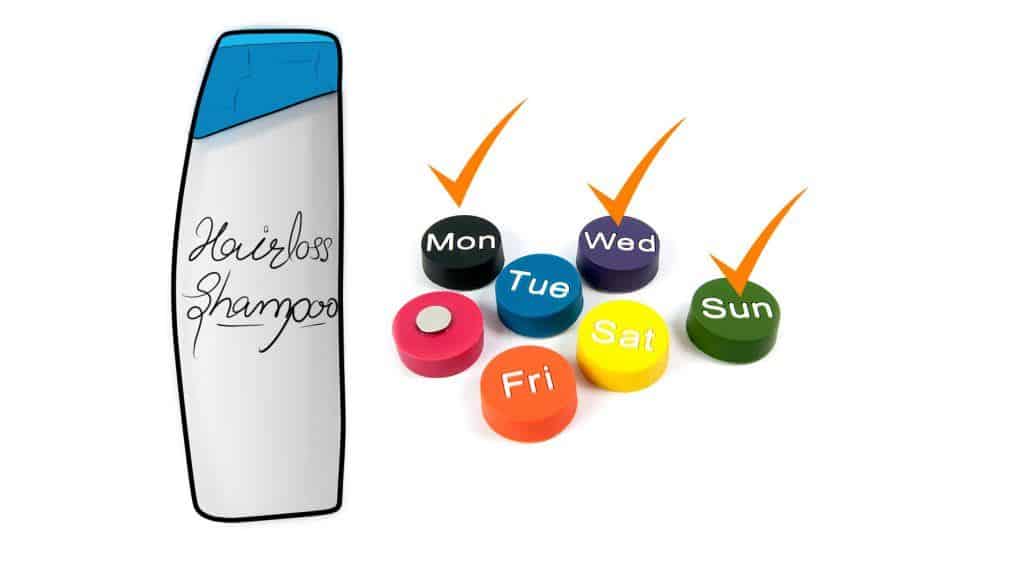 The best hair loss shampoos are gentle enough so that you can use them multiple times a week.
The best hair loss shampoos are gentle enough so that you can use them multiple times a week.
Nizoral, however, is most effective when used only a few times a week (and should be left on the hair for three to five minutes before rinsing).
But you can also alternate Nizoral with another type of hair loss shampoo – such as the Lipogaine products or Alpecin's Caffeine shampoo – for an effective one-two hair loss fighting punch.
Use Nizoral two to three times a week while using your other hair loss shampoo on the other days.
Or, if you want to keep things simple, you can use a product such as Revita or Ultrax Hair Surge as your all-in-one shampoo because they contain ketoconazole and won't be too harsh on your hair. This will ensure that your scalp grows stronger hair that is more resistant to hair breakage and shedding.
5. Read the instructions & list of ingredients
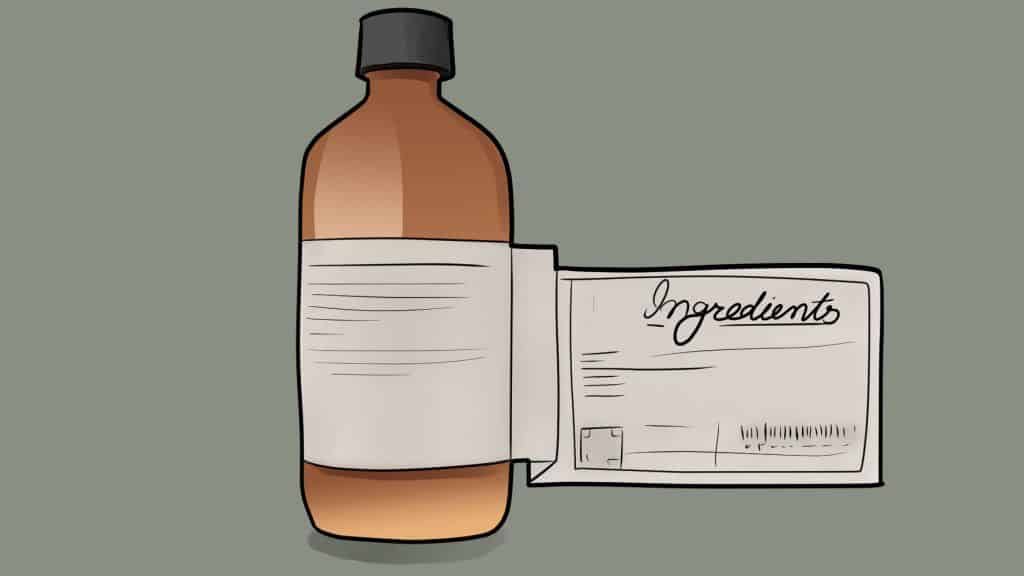 When in doubt, read the usage recommendations found on your hair loss shampoo's container.
When in doubt, read the usage recommendations found on your hair loss shampoo's container.
Those recommendations are there to ensure that you get the best results from your shampoo without causing damage to your scalp or hair.
Also, always pay attention to a product's list of ingredients to make sure that it doesn't contain something which may cause an allergic reaction.
Finally, consult with your doctor before using a hair loss shampoo while you're pregnant.
Most hair loss shampoos are safe for expecting mothers because their ingredients aren't absorbed into the bloodstream. Nizoral being an exception here as it is unknown if ketoconazole can affect a developing fetus.
Always read the label or follow your healthcare provider's advice.
Pro tip:
A healthcare provider's recommendation trumps the label. Consult your dermatologist before trying out anything that might have any kind of side effects on you or your baby.
A bit about women and hair loss
Hair loss can be devastating to many men, but perhaps even more so for women, who have often suffered in silence. But the fact is, women make up nearly 40 percent of hair-loss sufferers in the United States. While male pattern baldness is more common in women, it is also more socially acceptable, and the loss of hair in women can be damaging in more ways than one.
The psychological damage associated with hair loss is, for one hundred percent of many women, extensive, especially in a society where hair-loss in men – though usually unwanted – is more or less an accepted fact of life.
What's equally frustrating for women is that their hair loss is not as clearly understood as hair loss in men affecting not only the attitude people have toward it but also the number of product options available for them to deal with.
According to an article from dermentz.org, female pattern baldness "…presents itself quite differently from the more recognizable male pattern baldness." [25]
The same article also says that it's uncommon for women to follow a male pattern unless there is excessive production of androgens in her body.
Some factors that are thought to play a role in female hair loss include high androgen birth control pills, menopause, pregnancy, ovarian cysts, and other factors tied to the actions of hormones.
The American Hair Loss Association said it's essential that women who have a history of hair loss in their family be made aware of the potential effects of birth control pills on normal hair growth. [26]
Since the amount of research conducted on this and the information available to the world at this point is limited, hair loss products and anything else being used for ensuring a healthy scalp should always be tried and tested first.
Why we chose these products for our list of best hair loss shampoo
We talked about it earlier: while many hair loss shampoos claim to be the real deal, some fall on the side of snake oil. If you want a full head of hair, you will need to put in the proper research to know the ones that work from the ones that don't. Luckily, we've done that for you.
It's often challenging to sort through the many reviews to find out what's fake and what's not.
All that said, our primary consideration for choosing hair loss shampoos for our list was whether it produced actual results.
We also acknowledge that what might work for someone may not work for another, but we're interested in the overall picture. Based on your requirements, there are hair regrowth shampoos on this list suited for everyone.
Perhaps not surprisingly, the "big names" in the hair loss game – Revita, Lipogaine, Nizoral, etc. – made the grade, in part, because they've accumulated years of successful results. These shampoos have proven their effectiveness as reliable shampoos for hair growth and can be trusted based on their ingredients and reviews.
I personally use Revita 5 times a week and Nizoral on the remaining 2 days (Wednesdays and Sundays) and can attest that my hairline hasn't moved back a hair since. Some of it even grew back.
I'm also on finasteride and a form of minoxidil, which I would highly encourage you to be on if you have aggressive male pattern baldness, like me. You can read all about the finasteride, minoxidil, and ketoconazole combo here.
Conclusion
Be careful when it comes to choosing the best shampoo for hair growth and thickening. There are plenty of companies out there that make lofty claims about hair loss and hair growth shampoos but don't walk the walk.
Finding one that works for you will take some research and even trial-and-error, but the five we've listed here should serve you well. A lot of research has been put into the ingredients and the working of all these options, and we believe that there could definitely be a product on this list that can help you get fuller hair while also battling problems like dry hair.
We'd love to hear your comments regarding hair loss shampoosand which ones promote healthy hair growth. We want to hear what you think, and we promise to respond promptly. If you know someone who is struggling with hair loss, share this article with them, and feel free to check out our other articles if you're interested in similar topics, as well!
References
- Rafi, A. W., and R. M. Katz. "Pilot Study of 15 Patients Receiving a New Treatment Regimen for Androgenic Alopecia: The Effects of Atopy on AGA." ISRN Dermatology 2011 (2011). https://doi.org/10.5402/2011/241953.
- Rajput, Rajendrasingh J. "Controversy: Is There a Role for Adjuvants in the Management of Male Pattern Hair Loss?" Journal of Cutaneous and Aesthetic Surgery 3, no. 2 (2010): 82–86. https://doi.org/10.4103/0974-2077.69016.
- Jiang, Ju, Ryoji Tsuboi, Yuko Kojima, and Hideoki Ogawa. "Topical Application of Ketoconazole Stimulates Hair Growth in C3H/HeN Mice." The Journal of Dermatology 32, no. 4 (2005): 243–47. https://doi.org/10.1111/j.1346-8138.2005.tb00756.x.
- Fischer, T. W., E. Herczeg-Lisztes, W. Funk, D. Zillikens, T. Bíró, and R. Paus. "Differential Effects of Caffeine on Hair Shaft Elongation, Matrix and Outer Root Sheath Keratinocyte Proliferation, and Transforming Growth Factor-Β2/Insulin-like Growth Factor-1-Mediated Regulation of the Hair Cycle in Male and Female Human Hair Follicles in Vitro." The British Journal of Dermatology 171, no. 5 (November 2014): 1031–43. https://doi.org/10.1111/bjd.13114.
- Fischer, T. W., U. C. Hipler, and P. Elsner. "Effect of Caffeine and Testosterone on the Proliferation of Human Hair Follicles in Vitro." International Journal of Dermatology 46, no. 1 (January 2007): 27–35. https://doi.org/10.1111/j.1365-4632.2007.03119.x.
- Sboros, Marika. "Baldness Cure Close? Caffeine CAN Halt Hair Loss, Says German Scientist." BizNews.Com (blog), March 7, 2015. https://www.biznews.com/health/2015/03/07/baldness-cure-close-caffeine-can-halt-hair-loss-says-german-scientist.
- Otberg, N., A. Teichmann, U. Rasuljev, R. Sinkgraven, W. Sterry, and J. Lademann. "Follicular Penetration of Topically Applied Caffeine via a Shampoo Formulation." Skin Pharmacology and Physiology 20, no. 4 (2007): 195–98. https://doi.org/10.1159/000101389.
- El‐Esawy, Fatma Mohamed, Mohamed Saber Hussein, and Amira Ibrahim Mansour. "Serum Biotin and Zinc in Male Androgenetic Alopecia." Journal of Cosmetic Dermatology 18, no. 5 (2019): 1546–49. https://doi.org/10.1111/jocd.12865.
- Glynis, Ablon. "A Double-Blind, Placebo-Controlled Study Evaluating the Efficacy of an Oral Supplement in Women with Self-Perceived Thinning Hair." The Journal of Clinical and Aesthetic Dermatology 5, no. 11 (November 2012): 28–34.
- Patel, Deepa P., Shane M. Swink, and Leslie Castelo-Soccio. "A Review of the Use of Biotin for Hair Loss." Skin Appendage Disorders 3, no. 3 (2017): 166–69. https://doi.org/10.1159/000462981.
- El‐Esawy, Fatma Mohamed, Mohamed Saber Hussein, and Amira Ibrahim Mansour. "Serum Biotin and Zinc in Male Androgenetic Alopecia." Journal of Cosmetic Dermatology 18, no. 5 (2019): 1546–49. https://doi.org/10.1111/jocd.12865.
- Bandaranayake, Ilian, and Paradi Mirmirani. "Hair Loss Remedies—Separating Fact From Fiction," n.d., 8.
- Arca, Ercan, Gürol Açıkgöz, Yıldıray Yeniay, and Ercan Caliskan. "The Evaluation of Efficacy and Safety of Topical Saw Palmetto and Trichogen Veg Complex for the Treatment of Androgenetic Alopecia in Men." Turkish Journal of Dermatology / Türk Dermatoloji Dergisi 8 (December 5, 2014): 210–15. https://doi.org/10.4274/tdd.2302.
- Noronha, Regine Lucia. "Perception_Study," 2010. https://cdn2.shopify.com/s/files/1/0028/2935/3030/files/Perception_Study_58fe0d61-aab5-4fcb-bc0b-daf79ec3d0d3.pdf?30954.
- González-Rodríguez, M. L., and A. M. Rabasco. "Charged Liposomes as Carriers to Enhance the Permeation through the Skin." Expert Opinion on Drug Delivery 8, no. 7 (July 1, 2011): 857–71. https://doi.org/10.1517/17425247.2011.574610.
- DS Healthcare Group. "Science." Accessed July 6, 2020. https://dslaboratories.com/pages/science.
- Gensco Pharma. "The Difference Between Topical and Transdermal Medications," March 29, 2017. https://genscopharma.com/difference-topical-transdermal-medications/.
- Jiang, Ju, Ryoji Tsuboi, Yuko Kojima, and Hideoki Ogawa. "Topical Application of Ketoconazole Stimulates Hair Growth in C3H/HeN Mice." The Journal of Dermatology 32, no. 4 (2005): 243–47. https://doi.org/10.1111/j.1346-8138.2005.tb00756.x.
- RxList. "Side Effects of Nizoral Shampoo (Ketoconazole 2%), Warnings, Uses." Accessed September 19, 2020. https://www.rxlist.com/nizoral-shampoo-side-effects-drug-center.htm.
- Vieira, Celme, Stefano Evangelista, Rocco Cirillo, Annalisa Lippi, Carlo Alberto Maggi, and Stefano Manzini. "Effect of Ricinoleic Acid in Acute and Subchronic Experimental Models of Inflammation." Mediators of Inflammation. Hindawi, 2000. https://doi.org/10.1080/09629350020025737.
- Lin, Tzu-Kai, Lily Zhong, and Juan Luis Santiago. "Anti-Inflammatory and Skin Barrier Repair Effects of Topical Application of Some Plant Oils." International Journal of Molecular Sciences 19, no. 1 (January 2018): 70. https://doi.org/10.3390/ijms19010070.
- Snowden, J. M., and M. W. Whitehouse. "Anti-Inflammatory Activity of Emu Oils in Rats." InflammoPharmacology 5, no. 2 (June 1, 1997): 127–32. https://doi.org/10.1007/s10787-997-0021-x.
- Afshar, Mohammad, Reza Ghaderi, Mahmoud Zardast, and Parvin Delshad. "Effects of Topical Emu Oil on Burn Wounds in the Skin of Balb/c Mice." Dermatology Research and Practice 2016 (2016). https://doi.org/10.1155/2016/6419216.
- Jeengar, Manish Kumar, P. Sravan Kumar, Dinesh Thummuri, Shweta Shrivastava, Lalita Guntuku, Ramakrishna Sistla, and V. G. M. Naidu. "Review on Emu Products for Use as Complementary and Alternative Medicine." Nutrition 31, no. 1 (January 1, 2015): 21–27. https://doi.org/10.1016/j.nut.2014.04.004.
- "Female Pattern Hair Loss | DermNet NZ." Accessed September 19, 2020. https://www.dermnetnz.org/topics/female-pattern-hair-loss/.
- "American Hair Loss Association – Women's Hair Loss / Oral Contraceptives." Accessed September 19, 2020. https://www.americanhairloss.org/women_hair_loss/oral_contraceptives.html.
You might also like:
How to Stop Hair Loss in Men & Women Using These 15 Methods
Best Minoxidil Products for Men & Women to Regrow Hair
Best Natural DHT Blockers for Men & Women That Work
Can Dandruff Be Responsible For Hair Loss?
Why Am I Going Bald? Here's A Closer Look…
Best Seborrheic Dermatitis Shampoos that Work
How Will A Testosterone Supplement Affect My Beard
Source: https://www.baldingbeards.com/best-hair-loss-shampoo/







Tidak ada komentar:
Posting Komentar